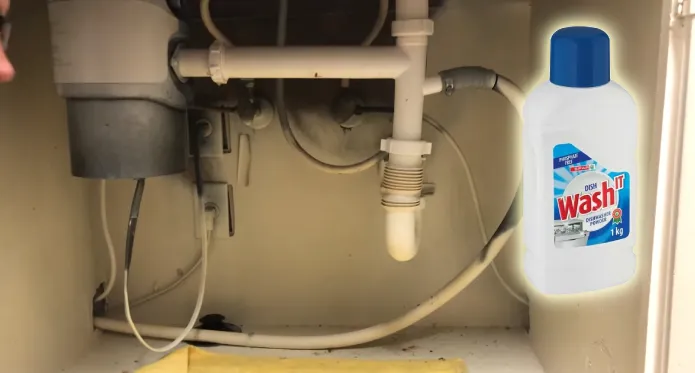Last Updated on November 14, 2023
If you’ve noticed your dishwasher isn’t functioning correctly and need to clean it, you may wonder if you can put a drain cleaner in it. It might seem like a good idea at first, especially since many products on the market promise to clear clogged drains quickly.
The answer is no. Using a harsh chemical cleaner in your dishwasher can have damaging effects on its internal components, as well as potentially contaminate the dishes inside. There is always the risk of hazardous chemicals leaking out and causing potential health risks for those in the household.
Fortunately, there are plenty of safer options available for cleaning and unclogging your dishwasher without having to turn to use harsh chemical cleaners.
We will discuss why we don’t recommend using drain cleaner in your dishwasher and what alternatives are available for cleaning and removing clogs safely. We will also go over simple steps for successfully using these safe options with instructions on avoiding the most common dishwasher cleaning mistakes.
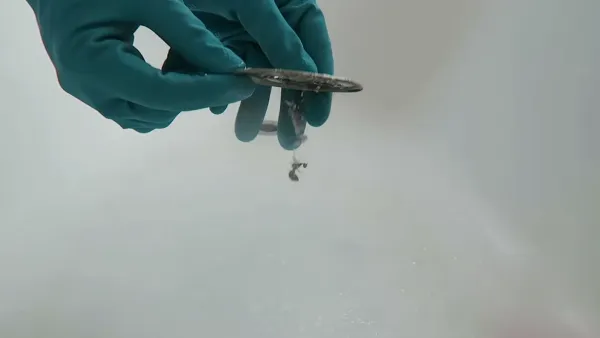
Can I Put Drain Cleaner In My Dishwasher: Damage Risks
When drain cleaner is used in a dishwasher, there are several risks, including:
Risk 01: Damage to the appliance
It is common for drain cleaners to contain harsh chemicals that can damage the internal components of a dishwasher, such as a pump, seals, and hoses. Drain cleaner in a dishwasher can shorten its lifespan and lead to costly repairs.

Risk 02: Contamination of dishes
The drain cleaner’s chemicals can contaminate dishes and make them unsafe to use. If someone consumes food contaminated with drain cleaner, they may experience symptoms such as nausea, vomiting, and burns to the mouth and throat.
Risk 03: Health hazards
Using drain cleaner can also pose potential health hazards to the user. The fumes produced by drain cleaners can be harmful to inhale, and coming into contact with the chemicals can cause skin irritation or chemical burns.
Harsh Chemicals in Drain Cleaners Can Damage the Internal Components
Drain cleaners contain harsh chemicals that are effective at breaking down clogs but can also harm appliances and individuals if misused. Some common chemicals found in drain cleaners include:

Harsh Chemical 01: Sodium Hydroxide
Also known as lye, sodium hydroxide is a caustic alkaline substance that can dissolve grease and hair. If ingested, it causes chemical burns and can cause blindness.
Harsh Chemical 02: Hydrochloric acid
Hydrochloric acid is a strong acid that can dissolve many types of clogs. It can cause burns to the eyes and skin and is harmful if ingested.
Harsh Chemical 03: Sulfuric acid
Sulfuric acid is a powerful acid that is highly corrosive and can cause burns to the skin and eyes. It can also release dangerous fumes when mixed with other chemicals.
Safer Options to Clean a Dishwasher and Remove Clogs
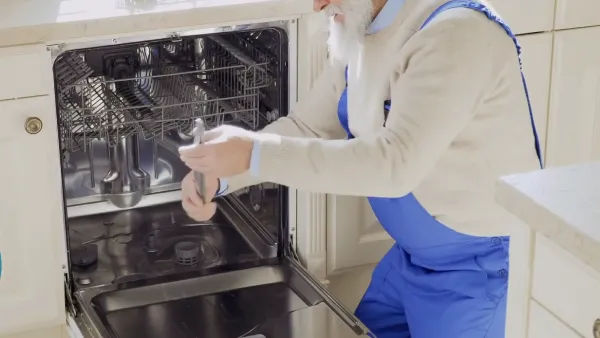
There are several safer options for cleaning a dishwasher and removing clogs that do not involve the use of harsh chemicals like drain cleaner. Here are a few methods you can try:
Option 01 Vinegar
You can use vinegar to clean and deodorize your dishwasher by running a cycle with a cup of white vinegar. The vinegar’s acidity will help remove any built-up grime and eliminate odors.
Option 02 Dishwasher Cleaner
There are a variety of dishwasher cleaners on the market specifically designed to remove stains, grime, and odors from dishwashers. Follow the instructions on the cleaner to use it effectively.
Option 03 Baking Soda
Baking soda is a natural cleaning agent that can remove stains and freshen the dishwasher’s interior. To use, sprinkle a cup of baking soda in the base of the dishwasher and run a hot water cycle.
Option 04 Lemon Juice
Lemon juice has natural deodorizing and cleaning properties that can help to remove stains and freshen the dishwasher. Mix equal parts lemon juice and water and run a cycle with the mixture.
Option 05 Hot Water
Sometimes, simply running a cycle with hot water can help to remove clogs and clean the dishwasher. Be sure to run the water until it is as hot as the dishwasher can handle to help dissolve any built-up grime.
Instructions in Simple Steps for Using these Options
Here are the common steps for using vinegar, dishwasher cleaner, baking soda, lemon juice, or hot water for cleaning dishwashers:
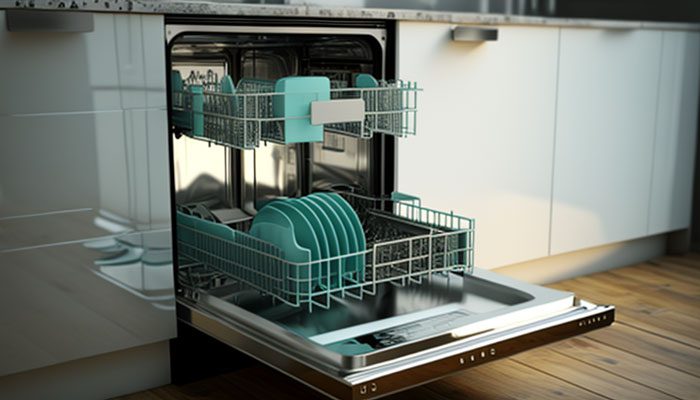
Step 01: Dishwasher dishes and other items should be removed.
Step 02: Follow the specific instructions for using the cleaning method of your choice (e.g., place a cup of vinegar on the top rack, sprinkle baking soda in the bottom of the dishwasher, mix lemon juice and water in a dishwasher-safe container, etc.).
Step 03: Run a hot water cycle on the highest setting.
Step 04: Once the cycle is complete, wipe down the dishwasher’s interior with a clean, damp cloth to remove any remaining grime.
It is essential to use caution when handling hot water or vinegar and follow the instructions carefully to avoid accidents or injuries. If the issue with the dishwasher persists after trying these methods, consider contacting a professional for assistance.
Are there any Alternative Methods for Cleaning My Dishwasher Drain?
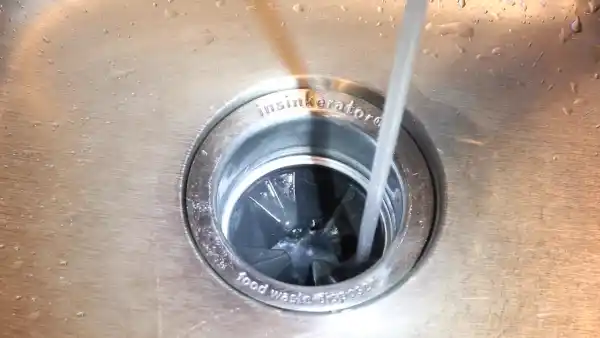
Yes, several alternative methods for cleaning your dishwasher drain are both effective and safe. To begin with, you should clean out any food particles from the filter in your dishwasher regularly.
You can add vinegar or baking soda to the wash cycle, which will help break down soap scum and grease buildup in the pipes. You can use an enzyme-based cleaner specifically made for drains or even a mixture of baking soda and boiling water for more stubborn clogs.
What Else Should I Do to Keep My Dishwasher Functioning Properly?
It is important to regularly clean out the filter of food particles in order to maintain a dishwasher. Other steps that can be taken to keep a dishwasher running smooth include:
- Running hot water through the appliance before each load
- Using a rinse aid
- Unloading dishes promptly after each cycle
- Running empty loads with white vinegar every once in a while
Depending on the appliance’s age, consider having it inspected by a professional technician if problems persist.
Common Mistakes When Cleaning the Dishwasher
Here are a few common mistakes people make when cleaning the dishwasher:

Not Cleaning The Dishwasher Regularly
It is important to clean the dishwasher regularly to prevent a build-up of food particles and grease. Neglecting to clean the dishwasher can lead to foul odors and reduced performance.
Using Too Much Detergent
Using too much detergent can leave a residue on dishes and cause over-foaming, which can lead to low-grade cleaning performance. It is important to use the recommended amount of detergent for your dishwasher.
Using The Wrong Type Of Detergent
Some types of detergents, such as those with bleach or other harsh chemicals, can damage the dishwasher or leave a residue on dishes. It is important to use a detergent specifically formulated for dishwasher use.
Neglecting To Clean The Filters
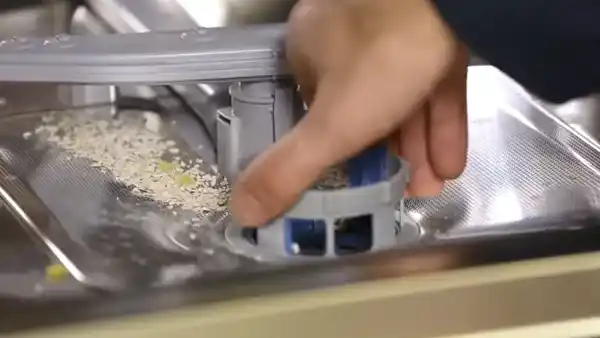
When dishwasher filters trap food particles, they are prevented from recirculating during the wash cycle. Neglecting to clean these filters can lead to poor cleaning performance and potential breakdowns.
Not Cleaning The Gasket And Seal
The gasket and seal around the dishwasher door can accumulate food particles, which can lead to odors and poor performance. Clean the gasket and seal it periodically to keep the dishwasher in good working order.
Tips and Tricks for Cleaning the Dishwasher
Here are a few tips and tricks for cleaning a dishwasher:

Use a Dishwasher Cleaner
Look for cleaners specifically formulated for dishwasher use and follow the manufacturer’s instructions.
Clean the Filters
Dishwashers have filters that trap food particles to prevent them from recirculating during the wash cycle. Clean these filters regularly to maintain the dishwasher’s performance. To clean the dishwasher filter, remove the filters from the dishwasher and run water on them.
Wipe down the Interior
Use a damp cloth or sponge to wipe down the dishwasher’s interior, including the walls, door, and bottom of the tub. Wiping will remove any particles of food that may have become stuck.
Clean the Gasket and Seal
If you need to clean the seal and gasket, use a soft cloth or sponge and mild detergent to wipe them down.
Run a Cycle with Vinegar
White vinegar can be used in a cycle to remove any odors or build-up of dirt and grime. The vinegar will help to break down any food particles and freshen up the dishwasher.
Use a Lemon
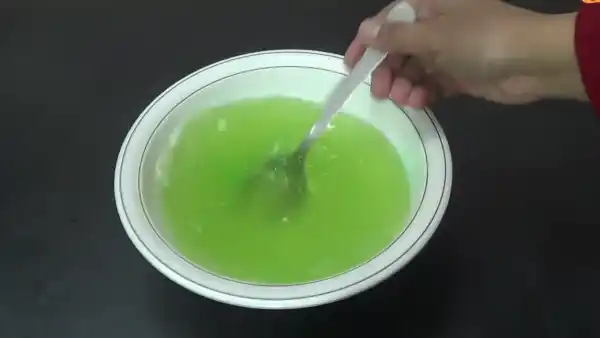
To freshen up the dishwasher and remove any lingering odors, you can cut a lemon into wedges and place them in the dishwasher. The lemon will release its natural oils and help to remove any bad odors.
Use Baking Soda
Run a hot water cycle in the dishwasher after adding a cup of baking soda. The baking soda will help to remove any stains and odors.
What is Drain Cleaner Used for?
Drain cleaner is a chemical substance used to clear clogged or slow-running drains. It is typically used to remove buildups of hair, grease, soap scum, and other materials that can cause clogs in sinks, showers, and other plumbing fixtures.
Despite being effective at removing clogs, drain cleaners can also be hazardous to appliances and individuals if misused. Following the instructions carefully when using drain cleaner and using caution to avoid accidents or injuries is essential.
Final Thoughts
While it might be tempting to use a drain cleaner in your dishwasher to help clear clogs or clean it out quicker, these harsh chemical solutions can cause damage to the internal components of your appliance or contaminate dishes inside with their residue or fumes.
Instead of relying on these dangerous solutions, try opting for safe alternatives such as baking soda and vinegar or enzymatic cleaners, which work just as effectively as any store-bought product but without risking long-term damage or health hazards.
By following the simple steps outlined here and avoiding common mistakes when cleaning your dishwasher, you can keep your appliance functioning properly all year round with minimal effort.
Following some simple tips applying them with tricks, such as increasing the frequency of cleaning the filters inside, also do not overload your dish washing assistant (dishwasher); you are able to make sure that your years old dish cleaning machine (dishwasher) works as like the new one does.

